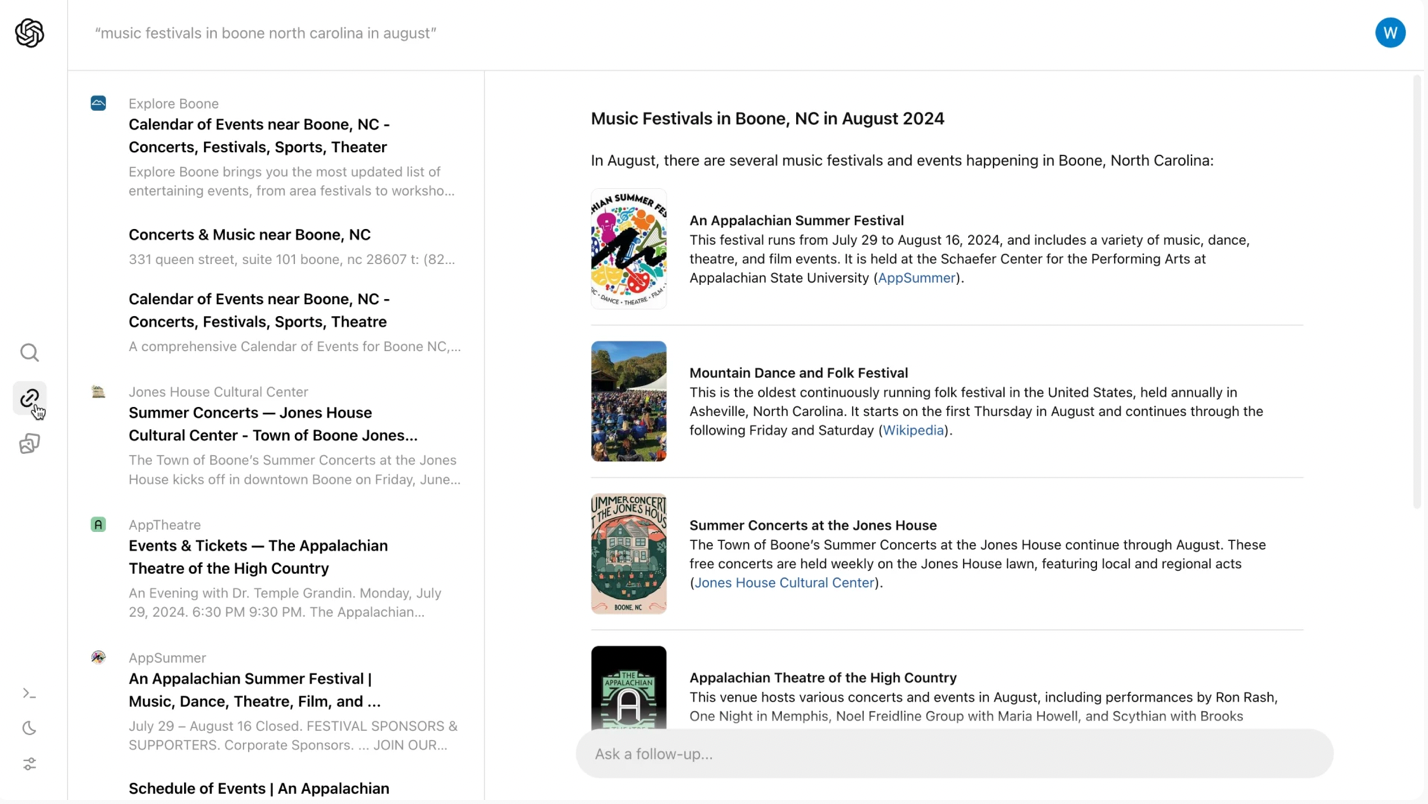OpenAI is testing SearchGPT, a “temporary prototype of new AI search features that give you fast and timely answers with clear and relevant sources.”
SearchGPT combines AI with internet data to provide better search results. OpenAI claims its new prototype delivers clearer, faster, and more accurate answers to user queries.
To refine the SearchGPT experience, OpenAI is conducting a limited test with a select group of users and publishers.
Want to find out more about GPT's new search engine?
Keep reading as we cover everything you need to know about SearchGPT, its main features, and how developers can use it to help build better products.👇🏼
Table of contents:
How SearchGPT works
Source: OpenAI
As we all know, finding credible and relevant information can sometimes be time-consuming and frustrating. SearchGPT makes the entire process smoother and more efficient by combining the “conversational capabilities” of ChatGPT models with real-time web data.
Using SearchGPT is easy. Type your query, and it’ll provide quick and direct answers to your questions, backed by up-to-date information and cited sources.
One of its stand-out features is its ability to hold a conversation. This makes it easier to get information as and when you need it.
You can also ask follow-up questions like you would during a regular back-and-forth conversation with another person. SearchGPT will then answer your questions with the understanding and shared context built from previous queries.
Video source: OpenAI
If you’re a researcher or publisher, you’ll appreciate how SearchGPT cites sources (with links) in searches. These sources will appear in a sidebar (see image below).

More control for content creators and publishers
OpenAI is launching SearchGPT alongside a new system for publishers to manage their presence within the search results. If you’re a content creator or publisher, this will give you more control over how your content appears.
Here's what's important:
- SearchGPT focuses solely on search and is completely separate from OpenAI's generative AI models.
- Websites can still be included in search results even if they choose not to participate in generative AI training.
How developers can use Llama 3.1 to build advanced models
With enhanced knowledge, flexibility, and multilingual prowess, Llama 3.1 empowers developers to explore uncharted territories in AI research and development. Keep reading for a deeper dive into Llama 3.1, its features, and how developers can use it to build advanced models.

How developers can use SearchGPT
If you use it properly, SearchGPT can be very useful for developers and software engineers. It can boost project efficiency, streamline workflows, and keep you ahead of the curve.
Want to learn more about how developers can use SearchGPT?
Check out these top use cases:
1. Find specialized GPT models
Need to use a GPT model for a specific function? Try using SearchGPT to find GPT models specialized for specific tasks such as natural language processing, code generation, data analysis, and more.
2. Perform comparative analysis
Comparing model performance can be a time-consuming task. But you can make the process a lot more efficient by letting SearchGPT do the heavy lifting for you.
For example, you could use it to conduct in-depth comparisons of different GPT models based on factors such as speed, accuracy, cost, and specific capabilities. With this info, you’ll have a better idea of which model is the best for your project.
3. Assist with product development
When developing a new product, you can discover methods and techniques to optimize your product’s performance. You can also use SearchGPT to quickly access guidelines and tutorials to help you integrate your models into existing systems and applications.
4. Improve application features
Use GPT models to add advanced features like natural language understanding, content generation, and user interaction improvements to your software products. Another great way to leverage this new GPT feature is for bug detection and code assistance.
5. Custom GPT model development
Developers can leverage SearchGPT to discover resources and tools for building custom GPT models. This includes finding suitable training datasets and learning effective fine-tuning techniques to tailor pre-trained models to specific applications and industries.
6. Product testing and quality assurance
SearchGPT can help you test your products by providing access to test cases, benchmarks, and performance evaluations of things like GPT models. Plus, you can leverage user feedback and real-world testing results to improve your product’s integration and functionality.
How to use GPT-4o mini to build AI applications (10 tips)
In a major move towards making artificial intelligence more accessible, OpenAI has unveiled GPT-4o mini, its “most affordable and intelligent small model” to date.

How do I get access to SearchGPT?
Since SearchGPT is currently in a limited testing phase, it’s not openly available to everyone. If you want to test it, you need to join OpenAI’s waitlist.
To join the waitlist, you can visit the OpenAI website and sign up.
Note: There's no guarantee of immediate access, but it's the only way to potentially get early access to SearchGPT.
Join our AI Accelerator Institute Pro Membership
The all-in-one platform for AI enthusiasts dedicated to continuous learning, networking, and career progression.
Our Pro membership is your AI career accelerator. Get exclusive access to expert insights, practical tools, and a community of AI professionals.
Plus, you get to rub shoulders with some of the brightest minds in AI at companies like Google DeepMind, OpenAI, and Microsoft Azure. It’s all about getting you those hot-off-the-press resources and linking up with a community of peers who share your passion for leveraging the power of AI.
Like what you see? Then check out tonnes more.
From exclusive content by industry experts and an ever-increasing bank of real world use cases, to 80+
deep-dive summit presentations, our membership plans are packed with awesome AI resources.
#ADD, #Ai, #AIModels, #AIResearch, #AISearch, #AiTraining, #Analysis, #Applications, #Artificial, #ArtificialIntelligence, #Azure, #Bank, #Benchmarks, #Blog, #Bug, #Building, #Career, #ChatGPT, #Code, #CodeGeneration, #Community, #Companies, #Content, #Continuous, #Creators, #Data, #DataAnalysis, #Datasets, #DeepMind, #Detection, #Developers, #Development, #Easy, #Efficiency, #Engine, #Engineers, #ExpertInsights, #Features, #Generative, #GenerativeAi, #Google, #GoogleDeepmind, #GPT, #Gpt4O, #GPT4OMini, #Guidelines, #How, #HowTo, #Industries, #Industry, #Insights, #Integration, #Intelligence, #Interaction, #Internet, #It, #Language, #Learn, #Learning, #Links, #Llama, #Llama3, #Llama31, #Microsoft, #MicrosoftAzure, #Model, #ModelPerformance, #Models, #Natural, #NaturalLanguage, #NaturalLanguageProcessing, #NaturalLanguageUnderstanding, #Networking, #One, #Openai, #Performance, #Platform, #Power, #Process, #Progression, #Project, #Prototype, #Query, #Reading, #RealTime, #Research, #Resources, #Search, #SearchEngine, #Sidebar, #Software, #SoftwareEngineers, #Speed, #Table, #TechNews, #Testing, #Time, #Tips, #Tools, #Training, #Tuning, #Tutorials, #Video, #Web, #Websites, #Workflows
Published on The Digital Insider at https://is.gd/599T84.
Comments
Post a Comment
Comments are moderated.